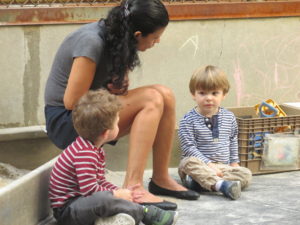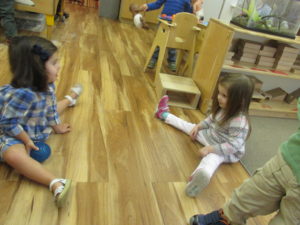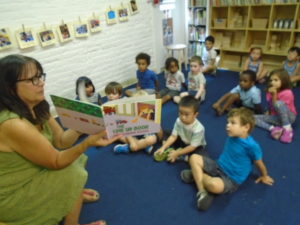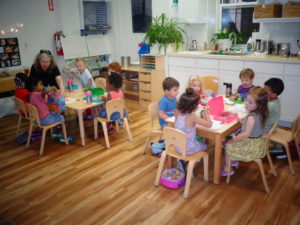The Beginning of a Beautiful Relationship
“The beginning is the most important part of the work.” Plato
A “first day” can be a daunting experience. Think back to a significant first day in your life— your first day of college or your first day at a new job. Will you find a friend? Will you get lost? Will you know what to do? Beginnings, while exciting and packed with possibilities, can also be filled with anxiety. Even for those of us with positive experiences in new situations and a solid, healthy sense of self, the moving into the unknown can be intimidating. Now imagine you are three years old and faced with your first first day of school! Imagine your questions and fears: Will my grown-ups remember where they put me? What if I have to go to the bathroom? What if I get hungry? What if I miss my mom? These are big, important questions that young children struggle with on their first days of school. And the answers can only come with time and experience. With each interaction between a child and a teacher or a child and a peer, the child confronts the unknowns of school and learns what to expect here. Because human beings develop in a social context, through direct interaction with one another, the impact of the  relationships of all the people in the class are quite significant. As a recent study from the National Scientific Council on the Developing Child (2004) states, “young children experience their world in an environment of relationships.” Children learn best when they are being metaphorically held in warm relationships with adults and their peers. While the power of the relationship between a parent and child has been widely recognized, the power of the relationship between a child and teachers is not as regularly understood. There is value given to what a teacher can do to instruct a child on skills or facts, but there is sometimes little value given to the significant, specific impact teachers have on the actual quality of life experience of a child. Current research shows that nurturing and stable relationships between a child and a teacher and a child and its peers are instrumental in healthy human development.
relationships of all the people in the class are quite significant. As a recent study from the National Scientific Council on the Developing Child (2004) states, “young children experience their world in an environment of relationships.” Children learn best when they are being metaphorically held in warm relationships with adults and their peers. While the power of the relationship between a parent and child has been widely recognized, the power of the relationship between a child and teachers is not as regularly understood. There is value given to what a teacher can do to instruct a child on skills or facts, but there is sometimes little value given to the significant, specific impact teachers have on the actual quality of life experience of a child. Current research shows that nurturing and stable relationships between a child and a teacher and a child and its peers are instrumental in healthy human development.
 At Greenhouse, we experience, first-hand, the power of these relationships. In the beginning weeks of school our teachers and children work together to build a foundation of trust on which they will construct their warm and supportive relationship. We do this by entering into a reciprocal learning exchange with our children. When they need us, we are there. When a child falls and scratches her knee, we are quick to respond with a gentle touch and Band-Aid. When a child misses his mom, we say, “Mom will come back after snack” and offer a warm, soft lap to curl up in and read “Llama, Llama Misses Mama” together. When the belly starts to growl, we get out some fresh fruit and crackers to answer the hunger pangs of the mid-morning. We know that the give and take, the relational mode of each interaction teaches the child that school is a safe place where he will find adults that love and care for him. And he will have some fun and learn new things along the way! Our teachers know that school is not just about learning your letters or counting to 20; it is also about learning how to live in a group and practice being in successful relationships with others. Quality indicators for early childhood programs used to only mean things like low child-to-adult ratios or adequately size physical classroom space. Now, we know it includes the quality of the relationship between the teacher and child–and that relationships starts on day one. Our faculty’s own emotional intelligence and personal attributes directly affect their interpersonal relationships with our children. They are expert at knowing when and how to release themselves from the busy tasks of the day and share an authentic moment with a child. They are doing the important work of building strong connections when they take a moment to listen to a child’s weekend adventure stories or listen to a child sing the praises of his Grandpa!
At Greenhouse, we experience, first-hand, the power of these relationships. In the beginning weeks of school our teachers and children work together to build a foundation of trust on which they will construct their warm and supportive relationship. We do this by entering into a reciprocal learning exchange with our children. When they need us, we are there. When a child falls and scratches her knee, we are quick to respond with a gentle touch and Band-Aid. When a child misses his mom, we say, “Mom will come back after snack” and offer a warm, soft lap to curl up in and read “Llama, Llama Misses Mama” together. When the belly starts to growl, we get out some fresh fruit and crackers to answer the hunger pangs of the mid-morning. We know that the give and take, the relational mode of each interaction teaches the child that school is a safe place where he will find adults that love and care for him. And he will have some fun and learn new things along the way! Our teachers know that school is not just about learning your letters or counting to 20; it is also about learning how to live in a group and practice being in successful relationships with others. Quality indicators for early childhood programs used to only mean things like low child-to-adult ratios or adequately size physical classroom space. Now, we know it includes the quality of the relationship between the teacher and child–and that relationships starts on day one. Our faculty’s own emotional intelligence and personal attributes directly affect their interpersonal relationships with our children. They are expert at knowing when and how to release themselves from the busy tasks of the day and share an authentic moment with a child. They are doing the important work of building strong connections when they take a moment to listen to a child’s weekend adventure stories or listen to a child sing the praises of his Grandpa!  They know when to infuse humor into the mix and get silly and wiggly with the kids. And they know when to be a steady, firm, consistent boundary setter or a warm, calm, source of much needed comfort. These moments where there is a sharing of one’s true self and one’s experience with another human being are the fabric of our relationships.
They know when to infuse humor into the mix and get silly and wiggly with the kids. And they know when to be a steady, firm, consistent boundary setter or a warm, calm, source of much needed comfort. These moments where there is a sharing of one’s true self and one’s experience with another human being are the fabric of our relationships.
Children’s relationships with each other are equally important. They have a lot to learn from each other. Research tells us that children who successfully make and keep friends and are accepted by the group tend to like school and perform better. Making friends is hard work and keeping friends is even harder work. There is a distinct difference between the give and take of  friendship and the casual encounters of peers in a group setting. Simply being with other children—like on the community playground or at a drop-off class—is different than cultivating a bond of friendship with a peer. The cooperation, empathy and impulse control needed to make and keep friends are essential skills children need to practice. Greenhouse provides the place for young children to do just that! Some children are eager for peer friendships and they seek them happily. Others are more onlookers and prefer to watch before jumping into social learning. Some are leaders with ideas to share and others are happy to go along for the ride and play the supporting role. The teacher’s job, as the children construct this social knowledge is to understand each individual child’s approach and temperament and support them on their journey. We will help them answer their big questions: How do you share an idea with someone else? How do you work together to see that idea to fruition? What do you do when you come up against someone who has a different idea? These are big questions and important skills that children will need through their lifetime.
friendship and the casual encounters of peers in a group setting. Simply being with other children—like on the community playground or at a drop-off class—is different than cultivating a bond of friendship with a peer. The cooperation, empathy and impulse control needed to make and keep friends are essential skills children need to practice. Greenhouse provides the place for young children to do just that! Some children are eager for peer friendships and they seek them happily. Others are more onlookers and prefer to watch before jumping into social learning. Some are leaders with ideas to share and others are happy to go along for the ride and play the supporting role. The teacher’s job, as the children construct this social knowledge is to understand each individual child’s approach and temperament and support them on their journey. We will help them answer their big questions: How do you share an idea with someone else? How do you work together to see that idea to fruition? What do you do when you come up against someone who has a different idea? These are big questions and important skills that children will need through their lifetime.
Greenhouse’s staff and faculty know that nurturing and stable relationships between a child and a teacher and a child and its peers help children experience and understand the social world. We pay special attention to the beginning of our relationships with children; our home visits, adjustment schedules, and small groups are concrete ways we intentionally set out to make our beginnings successful. The teacher’s responsive practice and reciprocal learning interaction with children create opportunity for ongoing relational discovery. During every day, children practice how to make and keep friends and work through the challenges of living in a group and being part of a community.
National Scientific Council on the Developing Child (2004). Young Children Develop in an Environment of Relationships: Working Paper No. 1. Retrieved from www.developingchild.harvard.edu
Gartrell, D., (2012) Education for a Civil Society: How Guidance Teaches Young Children Democratic Life Skills, 98–100, National Association for the Education of Young Children


